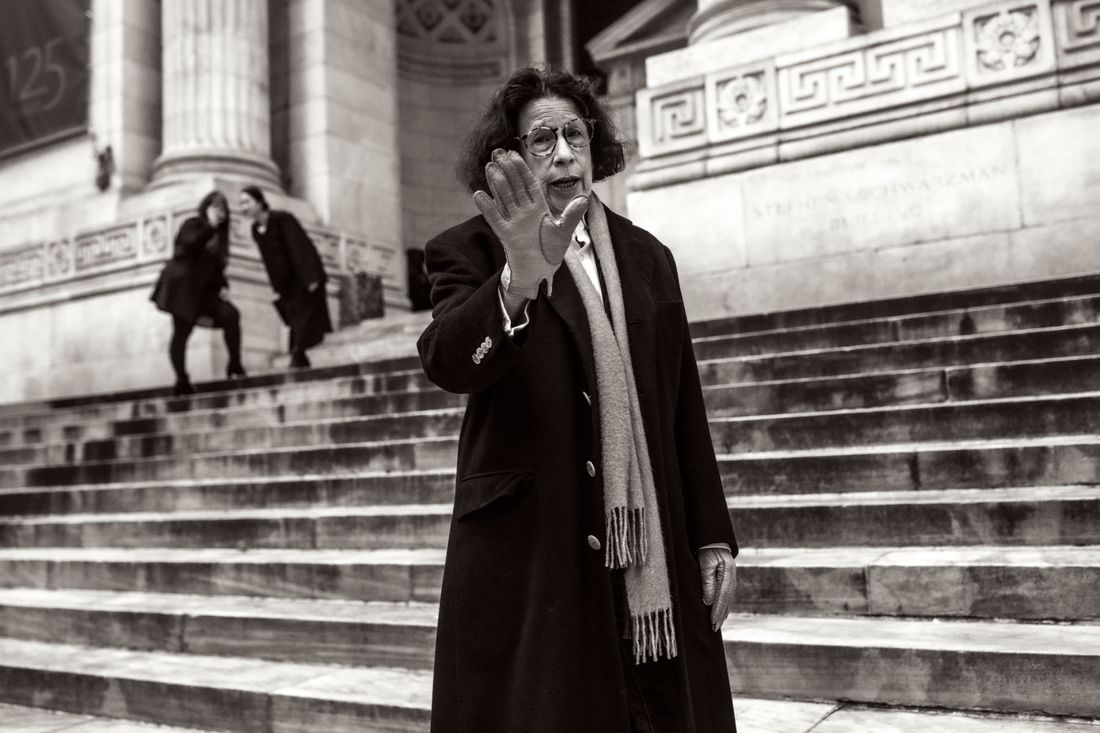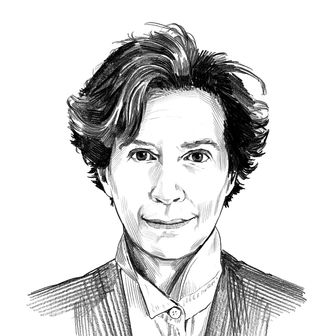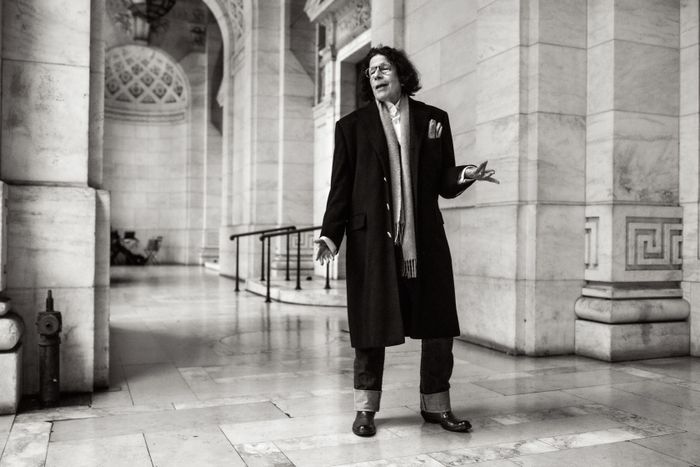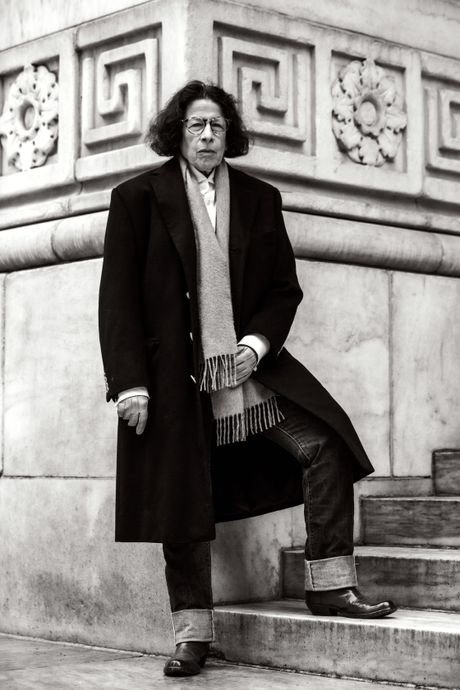
The first thing I asked Fran Lebowitz was, Could we meet at her apartment for this interview? Before I’d even finished the sentence, she said no. This was not surprising. Lebowitz has an apartment with enough room for her 12,000 book library, and for which she paid, she will tell you, as she does in Martin Scorsese’s delightfully acerbic and wise documentary series Pretend It’s a City, approximately three times what she could actually afford. She says the real-estate broker asked her if she needed space to throw parties. But she just doesn’t have people over. That’s not for her — never has been. So we talked on the phone — a landline with a 212 exchange, since she is a purposeful Luddite and doesn’t have a smartphone or a computer. Pretend It’s a City’s title references how much less authentic New York has become with people staring into their smartphones, among other sins. It was filmed before the pandemic. You watch it in bites over seven half-hour segments on Netflix, a bit like a passed tray of amuse-bouches. It’s a sequel of sorts to Scorsese’s 2010 documentary about her, Public Speaking. Lebowitz is invited everywhere, knows everyone, and always tells them just how she feels. Because she is so funny, she has always been able to get away with it. When I asked Scorsese why he did a second documentary on Fran, he answered in an email, “I always wanted to pick things up again with Fran, because she’s inexhaustible — her personality, her knowledge, her brilliance, most of all her humor. She makes me laugh. I think it’s healing. Laughter is healing. And we need that right now.”
When did Scorsese ask you to do this?
As soon as the first movie was finished, he said, “Let’s do another one,” and I said no. I said, “Marty, if someone made two documentaries about anyone, say, other than George Washington, I would raise my eyebrow, and since it’s me, I am raising both of them.”
Did you ask him why?
I think Marty enjoyed the experience, you know? I think that’s the reason. I think he had fun doing it. This I do know: Marty never feels anything’s finished. I mean if they would give it to him again, if they hadn’t torn it away from him, he’d still be working on Taxi Driver.
There are locations — the Queens Museum, the Players Club — in the film. But so much of it we spend just watching you walk around the city.
Originally, Marty’s idea was, “We are going to walk all around the city and talk,” and I pointed out to Marty that Marty, unlike other very well-known people, hates to be recognized. I said that there’s a high chance that you’re going to get two steps. It didn’t take much convincing. I walk around all the time, usually in a state of fury.
What makes you the angriest right now?
You know right at the beginning of the shutdown, probably the first week or ten days, when really no one was leaving their apartment, I decided to take a long walk. When I passed the New York Public Library, I really was devastated because I had never seen those doors closed during the day. And I stood in front of the library and there was no one there and on the whole walk I don’t think I passed a dozen people. Ordinarily I pass a dozen people getting out the door of my building, more than a dozen, and I just stood in front of the library, and I yelled, “Open the library! What’s wrong with you?” It made me very sad. And then I walked across 42nd Street. On the corner of 42nd Street, I looked up at Times Square and I thought, This is the thing you’ve been wanting for like 20 years. You wanted the tourists to leave, but this isn’t what I meant!
Lack of tourists is the one upside, then?
It is. I know that everyone gets angry at me because everyone keeps saying, “But we need them.” And I, since they lured them here in the ’70s, I was opposed to it in the ’70s. This was a plan when the city was going bankrupt. Four men or six men, I don’t know how many, but I am certain they were all men, went into a room and said, “What can we do?” and came up with this.
You, I am sure recall, that New York City was hated by the rest of the country. It was hated for all the things that were great about it, so in order to get these people to come here, you had to make it a place that they would like! The places they like they are from! So this is not what the New Yorkers wanted, because, of course, there are many New Yorkers also from those places, and they thought, I know I am from this place, but you know what? I am not going to stay here. So my feeling always is it’s no one’s fault where they’re from; it’s only your fault where you went.
So you had to make it a place that New Yorkers didn’t like and that people from out of New York liked. And the people who are making money kept saying, “But we need this.” But who is “we”? Who’s benefiting from this?
You say in the film, “I didn’t come here because it was safe and clean.”
Right. I didn’t come here ’cause it was dirty or because it was dangerous. I came here because it was not where I was from and because it was fun!
One of the things that has been very bad about New York, uh, has been what kind of people can come here. Now it’s much less expensive, so I am assuming that people who could not come here, I mean to live, can come here now. So it’s a big opportunity, if you’re young, and it’s a big opportunity for the city to get rid of some of the people who are not contributing to the city and to get some young people who are going to be more interesting.
You’ve lived in a couple of great apartments; one, at the Osborne, for 26 years.
I cannot stress to you how unbelievably unlucky and stupid I am about real estate, okay? So it is like … all the worst mistakes I have made in my life are real-estate mistakes. And all the worst luck I’ve had, I wouldn’t say all the worst, but a lot of the bad luck I’ve had is in real estate.
The Osborne is one of the oldest apartment buildings in the city, and they apparently had not touched it until I moved in. So the entire time I lived there they were rebuilding it. It meant that I was paying for it, in other words: endless assessments; noisy isn’t even the word — at one point, they replaced the risers, i.e., the water pipes, which were original to the building … They replaced them while people lived there! It was an abusive situation, and finally I just thought, Get out of here. When I moved from the Osborne, I knew I had 10,000 books, because the book guys, separate from the moving guys, counted them.
From the Osborne, I move to 4th Street. Then I move to the worst apartment I ever had, and the worst apartment anyone ever had, for one year, and then from there I moved to Greene Street for two years, and then I moved here.
However, by the time I got to this apartment and I had different book guys, they told me, “You have 12,000 books.” I don’t know how this happened.
You say in the film that the real-estate broker asked why you needed all that space: “Do you throw a lot of parties at home?” And you said, “Never.”
I still like parties.
Just not in your own home.
It’s actually one of the things I’ve missed, one of the many things I miss. Obviously, it’s not the most pressing issue during a fatal virus, but I once said, “No one invites me to any parties anymore?” And someone said, “There are no more parties anymore.” There are no parties right now; I mean, there are certain kinds of parties if you are 19, since I’m not … but I’ve always liked parties.
Why?
Because they’re parties! Okay? This is an event that the purpose of which is fun! So, I like fun. Ever since I’ve been old, which is really a pretty long time at this point, I have to always, and I make an effort to think, did I think this was better because it was better? Or did I just think it was better because it was better to be 25? And by better, I meant more fun. And it is more fun to be 25, no question. But some actual things were better whether you’re 25 or 105, which I am not quite.
The only reason I think that New York might have actually been more fun in the ’70s, and I am absolutely adamant about taking the virus time out of this, of course, this is a horrible time no matter how old you are — the only reason I think that is because people who are in their 20s are always coming up to me telling me how much they wished they lived in New York in the ’70s.
From your days at Interview magazine on, you’ve seemed to meet the most interesting people in the city.
If you are talking about me in the ’70s and being with those people, the key to that is that I knew the most words.
Am I wrong to think that you are secretly an optimistic, affirming person?
I am not optimistic; that is not the case. What I am is like a split personality: alternately extremely sociable. I’m a lounge lizard, I loved parties when I was young, I loved bars and clubs. I would say that at least for ten, maybe more years of my life, I was out all night, every single night, and that has not been true for many, many years, obviously, but, and then when I am not out, though, I am completely solitary. I loathe domestic life; probably one of the greatest accomplishments for any lesbian is to live by themselves their entire life. Because no, guess what, unh-unh–I so hate domestic life. I don’t want anyone in my house that I don’t know when they are leaving, so [laughing] I don’t want there to be anyone else in the house.
So you’ve never had a live-in relationship?
Never! That’s what I’m saying, never! Never. I never did it. I never would do it. I don’t want to do it. I have no interest in it. I don’t like domestic life like that. I am not that share-y a person; I’m not accommodating in that way, in any real way. I have zero ability or desire — the only monogamous relationship I have had in my life is with my car. That is my monogamous relationship; I still have that car, the same car, yes, and the reason that I still have this car is because, unlike humans, I am not tired of the car.
Where do you keep it?
It has its own apartment.
Where?
I am not going to say.
Have you ever used your oven?
Well, here’s the problem. This particular apartment — when I bought this apartment, I didn’t replace the stove, for instance, because the stove worked. And I didn’t think to ask; now the apartments in which I have bought my own stove was an era where they still had knobs on them. Okay? So now, and it could be ten years or more, stoves have computers in them, every single thing has a computer in it, so the reason everything breaks is because of the computers — so when a computer breaks, you can’t just call … There’s no such thing as a regular repairman, no, you need someone from NASA!
So I have been unable to turn the oven on, because it’s on some kind of computer; I can’t figure it out. So I don’t know how to turn the oven on, but I do know how to turn, whatever you call them, on top of the stove.
The burners?
Burners, and I did buy the refrigerator that’s here and did tell the people in charge of finding them: Think analog. So all the appliances in my apartment that I bought are the closest — they still have computers in them; there’s nothing you can do about it, but they do have a way that you can figure out how to turn it on or off.
When was the last time you had a party in your house?
Never.
Ever?
Well, that’s not true. When I lived in the Osborne, I gave a birthday party for my mother. I don’t remember how old she was — certainly younger than I am now — and it was family members and a few of my friends that my parents knew. I remember that I was sitting in my living room and I turned to a friend of mine and I said, “There aren’t enough ashtrays here,” and she said, “It’s your house.” And I remember that because it did not occur to me, Oh, you’re in charge of providing this stuff! This is not me. You’re the one that has to go get the ashtrays. You’re the one that has to ask people “Would you like another drink?”
I think that’s the only time I ever gave a party.
When all this is over, what are you looking forward to most?
So I would love to be able to eat inside. I would love to be able to — I know bookstores are open, but I’m very worried when I am inside, in the store; also, I am someone who touches every single book in a bookstore. I am not that afraid of touching things, but even though I am not a doctor, it does seem pretty clear to me that this is airborne.
But I still don’t feel comfortable, especially in the Strand and the Argosy, where I go to the secondhand department, where I am known to crawl under tables to see what they didn’t open up.
So I am looking forward to being unafraid of my physical environment, which I have never been before.
And I would love not to be wearing a mask. I know everyone hates it. This is one of the reasons I get so angry at people who are not using them, so I feel like saying, “Guess what? No one likes it!” It’s horrible, and especially if you wear eyeglasses, it’s a nightmare, because the second you put it on, you can’t see.
I would love to be able to not wear the mask — that is something I really am looking forward to. And not be so …
One thing about New Yorkers that I believe is different from other city dwellers: New Yorkers are very possessive. New Yorkers feel very strongly that they own things that they don’t even rent.
New Yorkers almost always use the word my before almost everything. My dry cleaner, my coffee shop, my table!
At a restaurant, you mean.
Yes, so when the city gets so devastated like this, many of the things that you thought you owned are gone. So they don’t only feel gone; they feel stolen. It’s like someone broke into your apartment and took your chair!
What else do you miss?
The thing I really, really miss, I have to say, is happenstance. I didn’t realize until the shutdown how much of my life was just running into people. There are a certain number of people I see by design, but there are tons of people that I am seeing all the time that I never made any arrangements with, and that is because I would see them at parties or at restaurants or at openings or at screenings or at museums or galleries, around town or even in the street! And that to me is another pillar of city life. And that’s gone, at least now. And that is something I really look forward to.
Pretend It’s a City is on Netflix.
*This article appears in the January 4, 2021, issue of New York Magazine. Subscribe Now!







